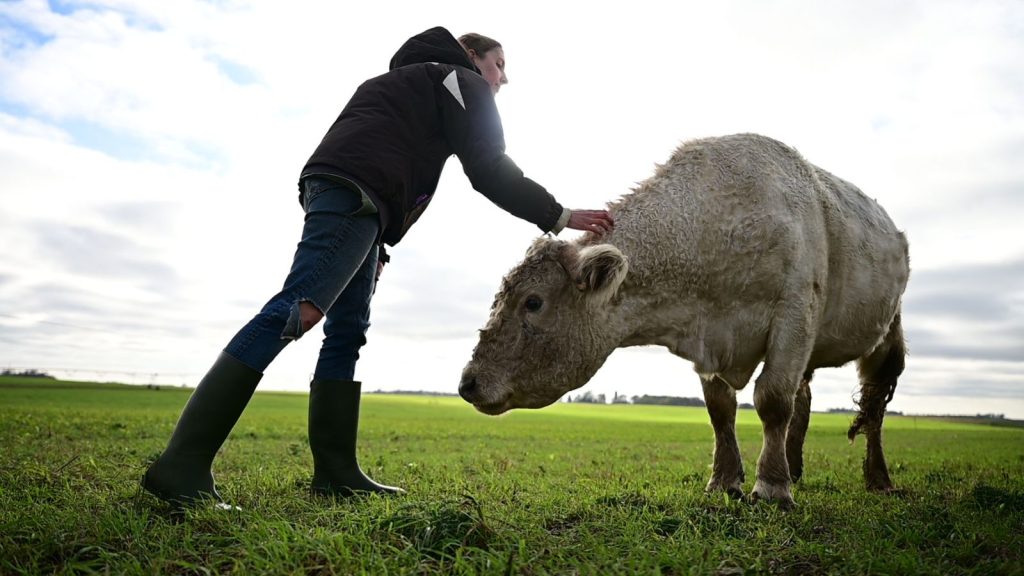Three mandatory COOL bills are making their way through Congress right now. We break each one down to find which ones are best for producers and consumers.
Country of Origin Labeling is back on the menu. As you read in our last blog article “Myths busted: Meatpackers are STILL lying to you about Country of Origin Labeling,” we are still fighting transnational corporations for our right to know where our food comes from. For decades, grassroots leaders, ranchers, and consumers have fought for country of origin labeling (COOL) of beef. We already have identical requirements for other similar products such as chicken or lamb, and this common-sense policy is wildly popular. In a 2013 survey by the Consumer Federation of America, 90% of respondents supported COOL for beef. So why are we still fighting for it?
Up until 2015, we had COOL for beef but retaliatory tariffs from Canada and Mexico through the World Trade Organization (WTO) was enough to make Congress cave to international corporate pressures and take away COOL for beef. Even though the US could have continued negotiation, or paid the tariffs which would be a pittance in comparison to the benefits to our local economies and producers, instead Congress decided to fold. In the years since 2015, a bipartisan coalition of Congressional members have refused to give up and have been advocating for the restoration of COOL for beef. Recently there have been three bills introduced to Congress that have caught our attention, the American Beef Labeling Act, the Country of Origin Labeling Enforcement Act and the Beef Origin Labeling Accountability Act.
What are the differences between these 3 bills? You’d be forgiven for not knowing, because they all would (theoretically) reinstate mandatory country of origin labeling for beef. But there are core differences constituents should know about concerning, timeline, enforcement, and addressing concerns about retaliatory tariffs.
American Beef Labeling Act: S.52, Sen. Thune (R SD) 8 bipartisan co-sponsors*
The oldest of the three bills introduced in January, 2023, S.52 directs the US trade representative (USTR) to develop a means of reinstating country of origin labeling which complies with the World Trade Organization’s rules. The USTR and USDA would have 1 year to negotiate with the WTO and our trade partners, if a deal is not made by that time, labeling requirements will revert back to pre-2015 rescission rules. Under S.52 COOL will be restored within 1 year, most likely in compliance with the rules of the WTO.
TAKE ACTION: We’re still fighting for the right to know where our beef comes from. Urge your Congressional delegation to support mandatory COOL today!
COOL Labeling Enforcement Act: H.R.5081, Rep. Hageman (R WY) 6 bipartisan co-sponsors*
Introduced in late July 2023, H.R.5081 explicitly excludes the authority of the WTO in its reasoning.
“No ruling by the World Trade Organization or by any other international organization of which the United States is a member that is established before, on, or after the date of enactment of this Act may be construed to limit, alter, or affect the authority of the Secretary of Agriculture to require country of origin labeling”
Furthermore, the bill would impose penalties for noncompliance to the tune of $1000 per pound. It would also require the USDA to conduct a study on the scale and effects of 10 years of mislabeled beef. Under H.R.5081, COOL will be restored within 6 months of passage despite WTO compliance, with stiff penalties for noncompliance.
Beef Origin Labeling Accountability Act: H.R.5215, Rep. Johnson (R SD) 0 co-sponsors*
The newest of the three bills was introduced in August 2023. This bill is more similar to S.52 than H.R.5081. The key difference is that unlike S.52 this bill would require the USTR and USDA to report back to Congress on their progress in negotiating a WTO-compliant deal with our trade partners every 6 months. Furthermore, the bill states that the USTR and USDA should include
“recommendations for legislation to implement the requirements of subsection (a), including the means of reinstating mandatory country of origin labeling for beef, if necessary, as well as engagements with the Trade Representative’s counterparts in other governments on this matter.”
This implies that H.R.5212 would not actually restore COOL but would instead provide policy avenues to that end. Under H.R.5215 COOL could theoretically be restored within 6 months but with no firm deadline, the process could languish for months or years.
What does it all mean?
WORC endorses the American Beef Labeling Act (S.52) and the COOL Labeling Enforcement Act (H.R. 5081). Although well-intentioned and a step in the right direction, H.R. 5215, lacks the strength of the other bills in question. Packers should pay the price for lying to consumers and the United States should prioritize the needs of its producers at home, not transnational corporations.
WORC and its allies are working hard to get mandatory COOL into the 2023 Farm Bill. If S.52 is included in the Senate version, and H.R. 5081 is wrapped into the House version, they will need to be conferenced (a process where the differences between the two chambers are reconciled). There are a hundred ways the final language could take shape but none are possible unless you make your voice heard.
We need folks like you, dear reader, to reach out to your senators, and members of Congress. Ranchers and consumers across this country need mandatory COOL as soon as possible, and Congress cannot delay anymore. Take action by clicking here! And keep an eye out for further developments from WORC by signing up for our newsletter.
* as of date of posting
Learn more:
We’re importing beef and labeling it “Product of the USA”
Myths busted: Meatpackers are STILL lying to you about Country of Origin Labeling
Repeal of Country of Origin Labeling (COOL) Continues to Cripple American Ranching Operations

Yes, I want to help WORC elevate Western voices and hold decision-makers accountable!





